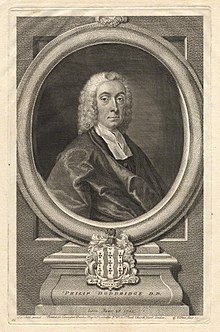Dum vivimus vivamus
This article needs additional citations for verification. (May 2013) |

Dum vivimus vivamus is a Latin phrase that means "While we live, let us live."[1][2] It is often taken to be an Epicurean declaration.[1]
This Latin phrase was the motto of Philip Doddridge's coat of arms.[3]
Usage
It serves as the motto for the Porcellian Club at Harvard. Emily Dickinson used the line in a whimsical valentine written to William Howland in 1852 and subsequently published in the Springfield Daily Republican:[4]
"Sic transit gloria mundi,"
"How doth the busy bee,"
"Dum vivimus vivamus,"
I stay mine enemy! [...]
It was also the motto inscribed on the sword of "Oscar" Gordon, the protagonist of Robert Heinlein's 1963 book Glory Road[5]. And it is the motto of the Knights of Momus, a New Orleans Carnival organization.[citation needed]
References
- ^ a b "dum vivimus, vivamus". Dictionary.com. Retrieved 2013-02-15.
- ^ "dum vivimus vivamus". merriam-webster.com. Merriam-Webster. Retrieved 2019-01-30.
- ^ Job Orton (1766). Memoirs of the Life, Character and Writings of the Late Reverend Philip Doddridge. London: J. Eddowes. p. 145.
- ^ Richard Benson Sewall (2003). The Life of Emily Dickinson. Cambridge, Mass.: Harvard University Press. p. 450. ISBN 0674530802.
- ^ Heinlein, Robert A. (1963). Glory Road (12th printing, 1970 ed.). Berkley Medallion Books. pp. 146–147. ISBN 0-425-01809-1.
External links
 Media related to Dum vivimus vivamus at Wikimedia Commons
Media related to Dum vivimus vivamus at Wikimedia Commons
